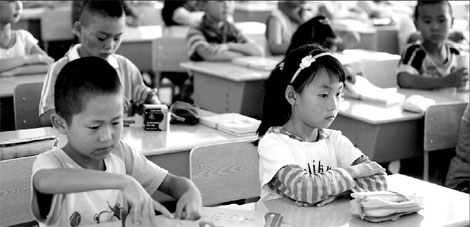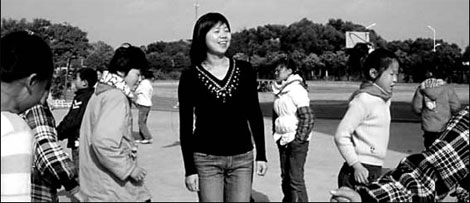|
|

Children attend a well-equipped primary school, specially built for those from migrant workers' families, in Yichang, Hubei province. Wen Zhenxiao / Asia News Photo
|
A school teacher draws on personal experience to paint an intimate portrayal of migrant-worker children in her much-acclaimed work. Qiu Yijiao reports
Xu Ling recalls vividly her early days as a teacher in the late 1990s. A couple came to see her in great distress. Their fifth-grader son had not done well in an exam, earning a strong rebuke from the father. The well-meaning man had only wanted to impress on his son that the ticket to a better life was a good education. But the frightened boy ran away from home.
After a long search, they found the boy huddled in a corner of the school, ready to take flight again as soon as he spotted them.
He was reassured only when his father expressed his remorse.
"I realized then that students from the countryside are very sensitive and fragile psychologically. They look strong and tough because they need to protect themselves in a new environment, but actually break down easily," Xu says in a telephone interview with China Daily.
According to figures available from the National Committee on Children and Women under the State Council, China has 20 million children of migrant workers living in the cities, struggling to integrate into urban life.
Their lives have drawn much attention recently and inspired several works of fiction and non-fiction.
Xu's novel Floating Flowers (Xiwang de Huaduo, Xiwang Publishing House, 2009), selected as one of the Top 10 children's literature works since 1949, draws generously on her experiences to present an intimate account of the lives of these children.
The novel features a Grade 5 schoolboy Wang Di, who comes from a small town in the west and studies at a public primary school in a southern city. Wang's family has no fixed home and he suffers from inferiority while in the city. He feels shunned and misunderstood by the city kids.
However, he perseveres and eventually gains confidence, becoming the class monitor and even forming a music band at the end of the novel.
Some critics have said the novel takes a simplistic approach to a complex issue but Xu says it is important that a book targeted at children carries a message of hope.
"The novel is imbued with optimism and I have modeled Wang's personality after the students I have encountered," she says, alluding to the boy's strong will and maturity.
A teacher of 11 years in a primary school in Zhangjiagang, a city in Jiangsu province, Xu, 37, says the number of rural students in her school has trebled over the past decade.
She says their evasive eyes and timid voices reflect their worries and uncertainties about their new life in the city. "This is a special social phenomenon of our times. Migrant workers lead a tough life in the cities and their children also have to shoulder the burden," Xu says. "But they are only children and they need happiness and encouragement as they are growing up."
While Xu calls them "floating flowers", she also points to their proud spirit. She recounts one instance when a rural student tore his shirt in a fight with a city peer, but refused a new one from the boy's parents.
"I see it as my duty to write their stories because apart from their parents, no one else is as close to them. They are like books full of liveliness, but hard to understand," Xu says.
She adds that she also feels obliged to pay more attention to these children. "Most of their parents are not able to give them adequate support - either materially or emotionally. They have to grow up by themselves."
Xu says she is very careful about how to talks to, and behaves with, them in front of other students. She believes teachers are role models that shape the attitudes of city children to those from the rural areas. "We teachers can do a lot to make them feel comfortable," Xu says.
She never hesitates to heap praise on her students and makes sure they have opportunities for class presentations and for taking part in competitions.
"They are generally happy when they have a sense of belonging and fulfillment. They are all talented children and what they need is recognition and approval."
Xu says children of migrant workers are easily satisfied, and once they have adjusted to their new surroundings, they are naturally frank, honest and generous.
Xu once saw a simple sentence carved on her desk: "I want to become a resident of the city."
"Where city children express their ambitions to become scientists and doctors, my rural students carry simple dreams in their hearts," she says. "I have always believed they will be successful if given equal opportunities. It takes time, but more importantly, society's understanding, love and respect. "
|

Xu Ling, a primary school teacher in Zhangjiagang, Jiangsu province, plays with her students after class. She is also the author of the award winning novel Floating Flowers.
|
(China Daily 06/01/2010 page20)
|